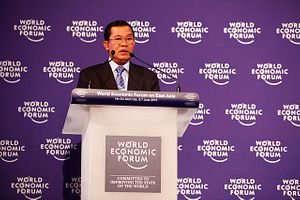Twenty-five years have passed since the signing of the Paris Peace Agreement, which ended the war in Cambodia and paved the way for the restoration of democratic institutions in the country. How has Cambodia fared so far?
Various groups, including some of the 18 parties that signed the agreement, commemorated the anniversary last October to highlight the most pressing political issues that continue to beleaguer the country.
There is consensus about the relevance of the agreement and its historic role in establishing the country’s constitution and the subsequent holding of elections in 1993. But critics bewail the failure of the Hun Sen government, which has been in power for three decades already, to implement the substantial provisions of the agreement, which would have strengthened democratic rule in the country.
They cited the recent passage of draconian laws that undermine trade unions and NGOs, the killing of government critics, the prosecution of opposition leaders, the unjust detention of activists, and the ban on street protests as disturbing signs of the government’s rejection of its commitment to fulfill the goals of the 1991 Paris agreement.
After visiting the country for 10 days, United Nations special rapporteur Rhona Smith lamented the deliberate violation of some constitutional processes.
“There are many examples of the law being applied in an apparently discriminatory or politicized manner. Restrictions on freedoms of assembly, expression and association are particularly problematic,” she said.
Earlier in September, 39 countries signed a statement addressed to the UN Human Rights Council about the deterioration of democracy in Cambodia.
“We are deeply concerned about the current escalation of political tensions in Cambodia, which threatens legitimate activities by opposition parties and human rights NGOs. There is particular concern about the appearance that legal action is being disproportionately pursued against critics of the government,” said the statement, which was read by United States Ambassador Keith Harper.
Chak Sopheap of the Cambodian Center for Human Rights reminded the government that the Paris Peace Agreement gave top priority to human rights protection.
“Human rights were not merely seen as a response to Cambodia’s past, but also as the best guarantee for a stable, prosperous, and peaceful future. The drafters of the Paris Peace Agreements saw respect for human rights as an essential condition for the creation of a ‘positive peace,’ which would allow real democracy to flourish,” she wrote in an article published by the Phnom Penh Post.
The government acknowledged the legacy of the 1991 Paris agreement, although Prime Minister Hun Sen was quick to add that it was his so-called “win-win” policy of granting amnesty, jobs, and land that effectively convinced the remaining Khmer Rouge elements to surrender in the 1990s.
Keo Remy, head of the government’s Human Rights Committee, asserted that the country’s situation has vastly improved since the signing of the 1991 Paris agreement.
“When you do more research you will know that the human rights situation in Cambodia is better. What’s most important is peace, because if there’s no peace then there’s zero human rights,” he said in a media interview.
In the end, Cambodians will decide whether the government has faithfully implemented the political objectives listed in the 1991 Paris Peace Agreement. Meanwhile, the countries that took part in the signing are also duty-bound to help in monitoring Cambodia’s progress in building a state where rule of law, plural democracy, and civil liberties are respected.

































